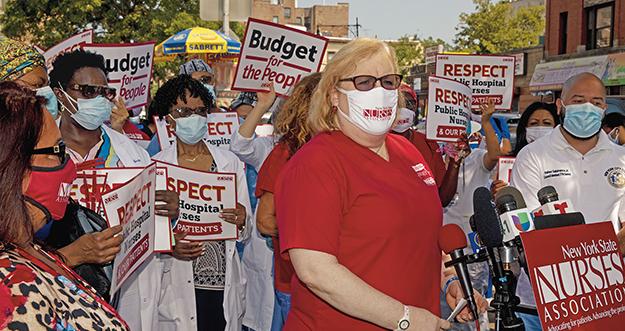No to budget cuts!

New York City’s public hospital nurses were on the frontlines during COVID-19, saving countless patients from this deadly virus. Now they are leading the fight against a looming threat to the public’s health—devastating budget cuts.
For months Albany has warned that healthcare, public transit, and school funding could face steep cuts if Washington doesn’t pass another COVID stimulus bill. But with Congress still deadlocked, a 20 percent across-the-board state budget cut is a clear and present danger. This year’s budget already included $2.5 billion in Medicaid cuts, and that’s why NYSNA, led by New York City Health + Hospital/Mayoral nurses, have been organizing to say no to these crippling cuts.
Building a movement
Over the summer, hundreds of NYSNA members participated in town hall meetings, discussing how New York can raise much-needed revenue and planning actions to amplify our message. Nurses kicked off NYSNA’s revenue campaign on August 25th in the Bronx, with demonstrations at Jacobi Medical Center and Lincoln Hospital. Hundreds of NYSNA members, elected officials, and community were on hand to demand immediate relief from Washington, and tell Albany it’s time for the richest New Yorkers to pay their fair share.
“We’ve done so much with so little for so long, there are those now who are convinced we can do everything with nothing. These budget cuts will destroy our public hospital system,” Sonia Lawrence, an RN at Lincoln Medical Center.
Public hospitals like Lincoln and Jacobi are the backbone of care in working class communities across New York City, particularly communities of color. “If you care about justice, if you care about equity, if you care about healthcare, if you care about immigrants, if you care about Black and Brown communities, if you care about nurses, don’t you dare cut the funding,” said Assemblyman Mike Blake.
On September 9, NYSNA members took the revenue campaign to Queens, rallying in front of Elmhurst hospital, once the global epicenter of the COVID-19 pandemic. “Our hospital has been pushed to the brink by COVID-19,” said Anthony Graniela, a nurse at Elmhurst hospital. “If Elmhurst can survive this pandemic, imagine with the right resources, the right staff, the right attention what we could accomplish.”
Richest New Yorkers must pay fair share
Speaking to the crowd gathered in front of Elmhurst hospital, Judith Cutchin, RN, president of the NYC Health + Hospitals Executive Council, outlined the stakes of this fight. “The public hospital system has been severely underfunded for generations,” she said, pointing out that the proposed cuts could drain over $800 million from the Health + Hospitals system. “Some of our patients can’t afford any payment at all,” Cutchin noted. “But they are welcome here. We take care of all New Yorkers.”
Nurses recognize the severe economic fallout from COVID-19, with over 3.5 million New Yorkers thrown out of work, and 1.5 million losing their employer-provided health insurance. But nurses have also been quick to point out that New York’s 118 billionaires have had a different experience, seeing their fortunes increase by $77 billion between March and June.
On Tuesday September 15, NYSNA members rallied outside Bellevue Hospital, carrying our revenue message forward. Elected officials and community leaders joined nurses to say it’s time for the wealthiest New Yorkers to pay their fair share.
“Bellevue nurses helped save New York from Ebola and COVID-19, but we won’t be able to save it from the massive budget and Medicaid cuts on the horizon,” said Todd Schultz, RN and LBU President at Bellevue. “COVID-19 was a reminder that the people of NYC and our entire healthcare system, including private sector hospitals, depend on public sector hospitals to function. Our work is essential and should be fully-funded. If the federal government is not willing to do the right thing and deliver funding to defeat COVID-19 and the economic crisis, New York State and City must step up!”